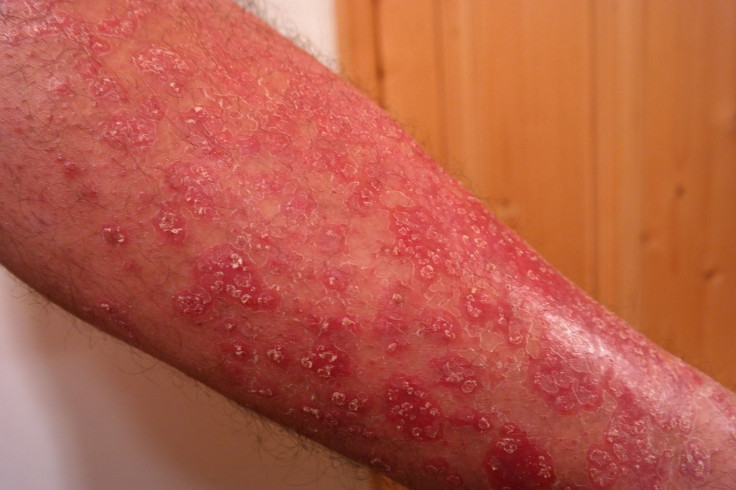Psoriasis Linked To Type 2 Diabetes, Obesity; Research Suggests Genetic Link

There are obvious associations between bad habits and health — smoking and lung cancer, and inactivity and obesity are two of the most common. Sometimes, though, there are links between conditions that are harder to trace. This may be the case with psoriasis, a chronic condition that's marked by itchy red and bumpy skin. Though prior studies have suggested a link between the three in the past, the results of a new Danish study adds weight to the theory.
Dr. Ann Sophie Lonnberg and her team from the University of Copenhagen examined health records of 33,588 twins, 4.2 percent of whom suffered from psoriasis and 1.4 of which were diabetic. Approximately 6.3 percent of the study subjects were obese, with a body mass index between 30 and 34; BMI between 18.5 and 24.9 is considered healthy. The study revealed that only 4.1 percent of people without diabetes exhibited psoriasis, but 7.6 percent of those with diabetes had the skin condition. In other words, people with psoriasis were twice as likely to suffer from type 2 diabetes as other people. In addition, the average BMI of people with psoriasis was higher than those without the condition: 25 compared to 24.4.
Interesting, too, was the fact there were 720 pairs of twins, where one twin suffered from psoriasis and the other did not.
“Psoriasis, type 2 diabetes mellitus and obesity are strongly associated in adults after taking key confounding factors such as sex, age and smoking into account,” the researchers wrote. “Results indicate a common genetic etiology of psoriasis and obesity.”
The authors suggest the association between psoriasis and obesity may, in part, be the result of a common genetic cause. However, they cannot infer causation. One possibility is that psoriasis predisposes individuals to a sedentary lifestyle, a risk factor for both obesity and diabetes. It's also possible that these conditions increase risk of developing psoriasis. Either way, more research is needed before experts can say precisely how the conditions are linked, It could mean better prevention and treatment methods for all three in the future.
Dr. Joel M. Gelfand, of the University Of Pennsylvania Perelman School Of Medicine, said the experiment provided new insights into previous associations between the conditions. Gelfand penned an editorial in response to the study, titled Psoriasis, Type 2 Diabetes Mellitus, and ObesityWeighing the Evidence.
“The unique twin design of the study of Lonnberg and colleagues, in which an increasing BMI was associated with a diagnosis of psoriasis, allowed the investigators to identify a genetic correlation between psoriasis and BMI," he said. "...these findings are consistent with emerging genetic evidence.”
Gelfand added that only a few studies have tackled the subject, and that the current experiment’s careful control of other factors is what strengthens the existing theory.
“These epidemiologic findings have clear implications for clinical practice,” he wrote. “Given the associations of psoriasis … and increases of BMI, most of our patients would be recommended for diabetes screening.”
Source: Lonnberg A, Skov L, Skytthe A, Kyvik K, Pedersen O, Thomsen S. Association of Psoriasis with the Risk for Type 2 Diabetes Mellitus and Obesity. JAMA Dermatology. 2016.
Published by Medicaldaily.com



























